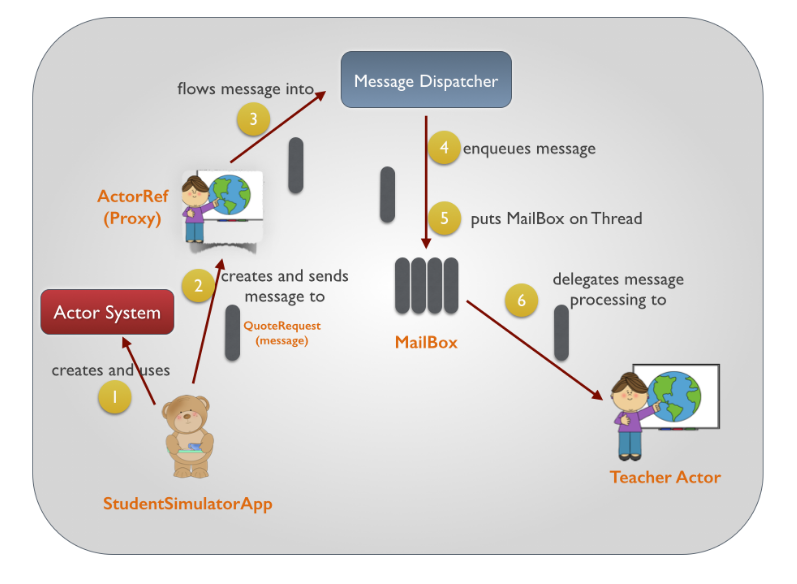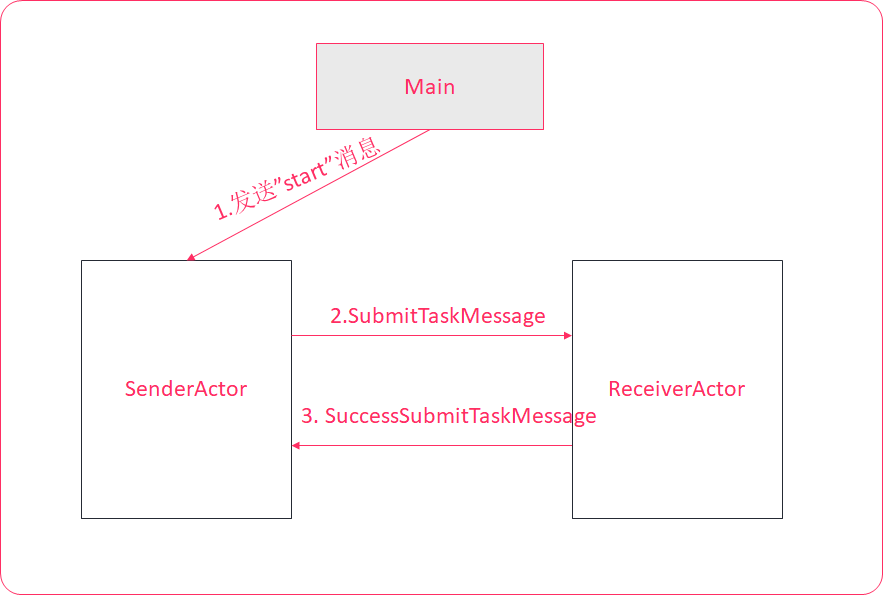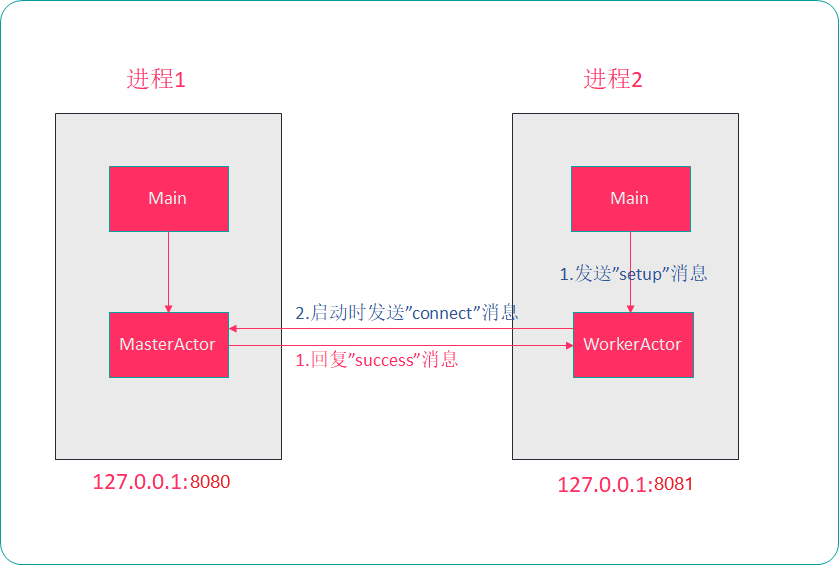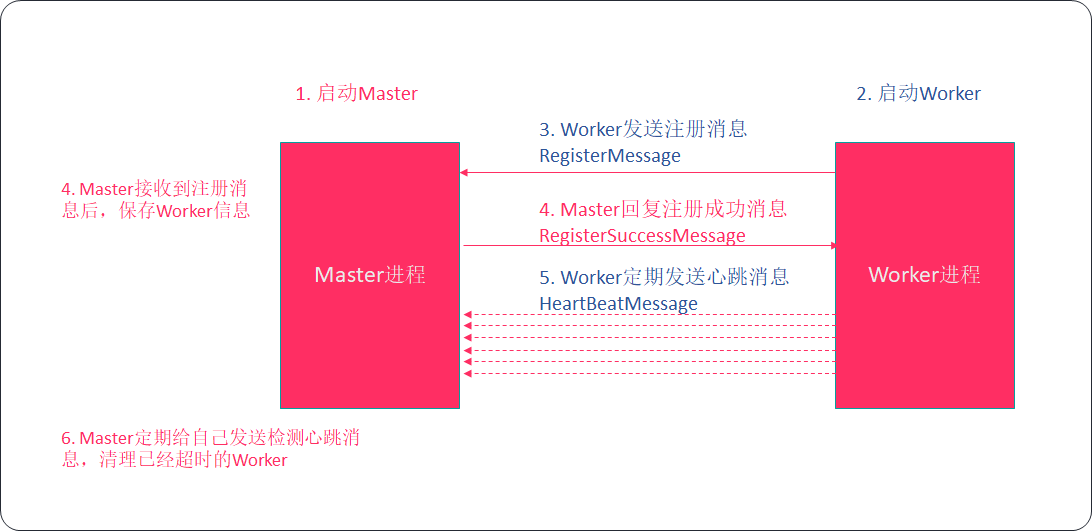summary
- Akka is a library developed using Scala. It is based on event driven toolkit for building high concurrency projects
- Akka characteristics:
- Provide an asynchronous, non blocking, high-performance event driven programming model
- The built-in fault tolerance mechanism allows the Actor to recover or reset in case of error
- Lightweight event processing (millions of actors per GB of heap memory. * lightweight event processing and heavyweight Division mainly depends on whether it depends on the operating system and hardware. Dependence is heavyweight and non dependence is lightweight
- It can build highly concurrent applications on a single machine or distributed applications in the network
Akka communication process

- Students create an actor system
- Create an actor ref message and send it to the teacher through actor Ref
- ActorRef sends the message to the message dispatcher
- The Message Dispatcher saves the messages to the MailBox of the target Actor in order
- Message Dispatcher puts the MailBox into a thread
- MailBox takes out the messages in order and finally passes them to the method received by TeacherActor
API introduction:
- Actor system: responsible for creating and supervising actors
- Actor system is a singleton object through which many actors can be created
- Use context System can get the reference of the ActorSystem that manages the Actor
- Implement Actor class
- Define class or singleton object to inherit Actor(import akka.actor.Actor)
- Implement the receive method to receive messages (without adding the loop & react method)
- You can implement the preStart() method (optional), which is executed after the Actor object is built and only once in the Actor life cycle
- Load Actor
- To create Akka's Actor object, you must first create ActorSystem
- Call actorsystem Actorof (props (Actor object), "Actor name") to load Actor
Actor Path
- Each Actor has a Path that can be referenced externally
| type | route |
|---|---|
| Local Actor | akka://actorSystem Name / user/Actor name |
| Remote Actor | akka.tcp://dest-actorSystem@ip address: port/user/Actor name |
Introductory case
- Load two actors (SenderActor & ReceiverActor) through the actor system, send messages from SenderActor, receive them in ReceiverActor, and then reply to messages

package com.akka.ex1
/**
* Message format for submitting tasks
*
* @param msg Send message
*/
case class SubmitTaskMessage(msg: String)
/**
* Format of receipt information after task submission is successful
*
* @param msg Receipt information
*/
case class SuccessSubmitTaskMessage(msg: String)
package com.akka.ex1
import akka.actor.Actor
object SenderActor extends Actor {
override def receive: Receive = {
// Receive the message sent by entry: start
case "start" => {
println("SenderActor, received: start!")
// Gets the path of the ReceiverActor
val receiverActor = context.actorSelection("akka://actorSystem/user/receiverActor")
// Send message to ReceiverActor
receiverActor ! SubmitTaskMessage("Hello ReceiverActor!, This is SenderActor.")
}
// Receive the receipt information returned by the ReceiverActor
case SuccessSubmitTaskMessage(msg) => println(s"SenderActor, received: ${msg}")
}
}
package com.akka.ex1
import akka.actor.Actor
object ReceiverActor extends Actor {
override def receive: Receive = {
// Receive messages from SenderActor
case SubmitTaskMessage(msg) => {
println(s"ReceiverActor, received: ${msg}")
// Reply to SenderActor
sender ! SuccessSubmitTaskMessage("Hi!, This is ReceiverActor.")
}
}
}
package com.akka.ex1
import akka.actor.{ActorSystem, Props}
import com.typesafe.config.ConfigFactory
object Entrance {
def main(args: Array[String]): Unit = {
/**
* Create an Actor system to be responsible for creating and supervising actors
*
* @param name : scala.Predef.String Set a name for ActorSystem
* @param config : com.typesafe.config.Config Configuration environment
*/
val actorSystem = ActorSystem("actorSystem", ConfigFactory.load())
/**
* Load custom Actor objects through ActorSystem
*
* @param props : akka.actor.Props Specifies the Actor companion objects to manage
* @param name : scala.Predef.String Sets the name of the specified Actor object
*/
val senderActor = actorSystem.actorOf(Props(SenderActor), "senderActor")
// You must set a name for each Actor, otherwise you cannot pass context. From inside SenderActor Obtain the object of the ReceiverActor in the Actor selection mode
// The actor will be prompted[ akka://actorSystem/user/receiverActor ] was not delivered
actorSystem.actorOf(Props(ReceiverActor), "receiverActor")
// Send "start" string to SenderActor
senderActor ! "start"
}
}
SenderActor, received: start!
ReceiverActor, received: Hello ReceiverActor!, This is SenderActor.
SenderActor, received: Hi!, This is ReceiverActor.
Timed task case
- Through actorsystem scheduler. Schedule() method to start the scheduled task
- Usage 1:
final def schedule(
initialDelay : FiniteDuration, // Start for the first time, press the set time, and execute after delay
interval : FiniteDuration, // How often is it executed (starting for the first time, immediately, without delay)
receiver : ActorRef, // Set the Actor that the target receives the message
message : Any) // Message to send
(implicit executor : ExecutionContext, sender : ActorRef = {}) // Implicit parameter, need to import
- Usage 2:
final def schedule( initialDelay : FiniteDuration, // Start for the first time, press the set time, and execute after delay interval : FiniteDuration // How often is it executed (starting for the first time, immediately, without delay) )(f : => Unit) // Functions (messages) to be executed periodically (implicit executor : ExecutionContext) // Implicit parameter, need to import
package com.akka.ex2
import akka.actor.{Actor, ActorSystem, Props}
import com.typesafe.config.ConfigFactory
object MainActor {
object ReceiverActor extends Actor {
override def receive: Receive = {
case x => println(x)
}
}
def main(args: Array[String]): Unit = {
// Create an Actor system to be responsible for creating and supervising actors
val actorSystem = ActorSystem("actorSystem", ConfigFactory.load())
// Load custom Actor objects through ActorSystem
val receiverActor = actorSystem.actorOf(Props(ReceiverActor), "receiverActor")
// Import implicit parameter & Transformation
import actorSystem.dispatcher
import scala.concurrent.duration._
// Send messages to the ReceiverActor regularly through the timer
// Method 1: adopt the message of Any data type parameter provided
actorSystem.scheduler.schedule(3 seconds, 2 seconds, receiverActor, "Hello ReceiverActor!, 111.")
// Method 2: messages using custom functions
actorSystem.scheduler.schedule(0 seconds, 5 seconds) {
receiverActor ! "Hello ReceiverActor!, 222."
}
}
}
Communication case between two processes

- The WorkerActor sends a "connect" message to the MasterActor
- MasterActor replies "success" message to WorkerActor
- The worker actor receives and prints the received message
package com.akka.master
import akka.actor.Actor
object MasterActor extends Actor {
override def receive: Receive = {
case "setup" => println("MasterActor started!")
// Receive messages from WorkerActor
case "connect" => {
println("MasterActor, received: connect!")
// Receipt information returned to the sender (WorkerActor)
sender ! "success"
}
}
}
package com.akka.master
import akka.actor.{ActorSystem, Props}
import com.typesafe.config.ConfigFactory
object Entrance {
def main(args: Array[String]): Unit = {
val actorSystem = ActorSystem("actorSystem", ConfigFactory.load())
val masterActor = actorSystem.actorOf(Props(MasterActor), "masterActor")
// Send message to MasterActor
masterActor ! "setup"
}
}
package com.akka.worker
import akka.actor.Actor
// Path of WorkerActor: akka tcp://actorSystem @127.0.0.1:8081/user/WorkerActor
object WorkerActor extends Actor {
override def receive: Receive = {
case "setup" => {
println("WorkerActor started!")
// Get MasterActor remotely
val masterActor = context.system.actorSelection("akka.tcp://actorSystem@127.0.0.1:8080/user/masterActor")
// Send the string connect to the MasterActor
masterActor ! "connect"
}
// Receive messages from MasterActor
case "success" => println("MasterActor, received: success!")
}
}
package com.akka.worker
import akka.actor.{ActorSystem, Props}
import com.typesafe.config.ConfigFactory
object Entrance {
def main(args: Array[String]): Unit = {
val actorSystem = ActorSystem("actorSystem", ConfigFactory.load())
val workerActor = actorSystem.actorOf(Props(WorkerActor), "workerActor")
// Send message to WorkerActor
workerActor ! "setup"
}
}
Implementation case of simple Spark communication framework
- Simulate the communication between Spark Master and multiple workers

- Operation steps:
-
Start MasterActor
1.1 after the masteractor object is built, start the scheduled task (for self-test, to remove the overtime WorkerActor) -
Start WorkerActor
2.1 after the workeractor object is built, encapsulate its own information into registration information and send it to MasterActor -
MasterActor receives the registration information of WorkerActor and saves it
3.1 receipt information to WorkerActor -
After the WorkerActor requests registration, it receives the information and prints Connection is successful!
4.1 start the scheduled task and send a heartbeat message to the MasterActor -
The MasterActor receives the heartbeat message from the WorkerActor and updates the last heartbeat time in the registration information of the WorkerActor to the current time
| project name | explain |
|---|---|
| scala-spark-akka-common | Store public message entity classes |
| scala-spark-akka-master | Akka Master node |
| scala-spark-akka-worker | Akka Worker node |
package com.akka.spark.common
/**
* A class that holds information about registered workeractors
*
* @param workerId : WorkerActor Id(UUID) of
* @param cpuCores : WorkerActor Number of CPU cores
* @param memory : WorkerActor Memory size
* @param lastHeartBeatTime : Last heartbeat time
*/
case class WorkerInfo(workerId: String, cpuCores: Int, memory: Int, lastHeartBeatTime: Long)
package com.akka.spark.common
/**
* WorkerActor Class submitting registration information
*
* @param workerId : WorkerActor Id(UUID) of
* @param cpuCores : WorkerActor Number of CPU cores
* @param memory : WorkerActor Memory size
*/
case class WorkerRegisterMessage(workerId: String, cpuCores: Int, memory: Int)
/** The singleton object that receives the receipt after successful registration*/
case object RegisterSuccessMessage
/**
* WorkerActor Information class that regularly triggers heartbeat to MasterActor
*
* @param workerId : WorkerActor Id(UUID) of
* @param cpuCores : WorkerActor Number of CPU cores
* @param memory : WorkerActor Memory size
*/
case class WorkerHeartBeatMessage(workerId: String, cpuCores: Int, memory: Int)
package com.akka.spark.master
import com.typesafe.config.{Config, ConfigFactory}
// Class used to read configuration file information
object ConfigUtils {
// 1. Get configuration file object
private val config: Config = ConfigFactory.load()
// 2. Get the time interval to check the heartbeat of WorkerActor
val `master.check.heartbeat.interval` = config.getInt("master.check.heartbeat.interval")
// 3. Get WorkerActor heartbeat timeout
val `master.check.heartbeat.timeout` = config.getInt("master.check.heartbeat.timeout")
}
package com.akka.spark.master
import akka.actor.{ActorSystem, Props}
import com.typesafe.config.ConfigFactory
object Master {
def main(args: Array[String]): Unit = {
val actorSystem = ActorSystem("actorSystem", ConfigFactory.load())
actorSystem.actorOf(Props(MasterActor), "masterActor")
}
}
package com.akka.spark.master
import java.util.Date
import akka.actor.Actor
import com.akka.spark.common.{RegisterSuccessMessage, WorkerHeartBeatMessage, WorkerInfo, WorkerRegisterMessage}
object MasterActor extends Actor {
// 1. Define a variable Map set to save the registered WorkerActor information
private val regWorkerMap = scala.collection.mutable.Map[String, WorkerInfo]()
// MasterActor regularly checks the heartbeat of WorkerActor and removes the workers that have timed out
override def preStart(): Unit = {
// 1. Import time implicit parameter & conversion
import context.dispatcher
import scala.concurrent.duration._
// 2. Start the scheduled task (MasterActor self test removes the overtime WorkerActor)
context.system.scheduler.schedule(0 seconds, ConfigUtils.`master.check.heartbeat.interval` seconds) {
// 3. Workeractor that filters timeout (return the filtered workerId set)
val timeOutWorkerMap = regWorkerMap.filter {
keyVal => // Data format of keyVal: workerid - > workerinfo (workerid, cpucores, memory, lastheartbeattime)
// 3.1 get the last heartbeat time of the current WorkerActor object
val lastHeartBeatTime = keyVal._2.lastHeartBeatTime
// 3.2 if timeout occurs, true; otherwise, false (current time - last heartbeat time) > maximum timeout * 1000
if ((new Date().getTime - lastHeartBeatTime) > (ConfigUtils.`master.check.heartbeat.timeout` * 1000)) true else false
}
// 4. Set of timed out workerids to be removed
if (!timeOutWorkerMap.isEmpty) {
regWorkerMap --= timeOutWorkerMap.map(_._1) // ArrayBuffer(5b9feb50-5c33-496b-a325-dd168360281b)
}
// 5. Valid workeractors are arranged in descending order according to the memory size
val workerList = regWorkerMap.map(_._2).toList.sortBy(_.memory).reverse
println(s"Active WorkerActors: ${workerList}")
}
}
override def receive: Receive = {
// Receive the registration information of WorkerActor
case WorkerRegisterMessage(workerId, cpuCores, memory) => {
// Print the received registration information
println(s"MasterActor, received info: ${workerId}, ${cpuCores}, ${memory}")
// Save the registration information to the hash table & and record the last heartbeat time
regWorkerMap += workerId -> WorkerInfo(workerId, cpuCores, memory, new Date().getTime)
// Receipt information for registered WorkerActor
sender ! RegisterSuccessMessage
}
// Receive heartbeat message from WorkerActor
case WorkerHeartBeatMessage(workerId, cpuCores, memory) => {
println(s"MasterActor, received heartbeat: ${workerId}")
// Updates the last heartbeat time of the specified WorkerActor object
regWorkerMap += workerId -> WorkerInfo(workerId, cpuCores, memory, new Date().getTime)
}
}
}
package com.akka.spark.worker
import com.typesafe.config.{Config, ConfigFactory}
// Class used to read configuration file information
object ConfigUtils {
// 1. Get configuration file object
private val config: Config = ConfigFactory.load()
// 2. Get the heartbeat interval of WorkerActor
val `worker.heartbeat.interval`: Int = config.getInt("worker.heartbeat.interval")
}
package com.akka.spark.worker
import akka.actor.{ActorSystem, Props}
import com.typesafe.config.ConfigFactory
object Worker {
def main(args: Array[String]): Unit = {
val actorSystem = ActorSystem("actorSystem", ConfigFactory.load())
actorSystem.actorOf(Props(WorkerActor), "workerActor")
}
}
package com.akka.spark.worker
import java.util.UUID
import akka.actor.{Actor, ActorSelection}
import com.akka.spark.common.{RegisterSuccessMessage, WorkerHeartBeatMessage, WorkerRegisterMessage}
import scala.util.Random
object WorkerActor extends Actor {
// Represents a reference to the MasterActor
private var masterActor: ActorSelection = _
// Registration information of WorkerActor
private var workerId: String = _
private var cpuCores: Int = _ // Number of CPU cores
private var memory: Int = _ // Memory size
private val cpuCoreList = List(1, 2, 3, 4, 6, 8) // Random range of CPU cores
private val memoryList = List(512, 1024, 2048, 4096) // Random range of memory size
override def preStart(): Unit = {
// Gets a reference to the MasterActor
masterActor = context.system.actorSelection("akka.tcp://actorSystem@127.0.0.1:8080/user/masterActor")
// Random setting number
workerId = UUID.randomUUID().toString
// Randomly select the number of CPU cores and memory size of WorkerActor
val r = new Random()
cpuCores = cpuCoreList(r.nextInt(cpuCoreList.length))
memory = memoryList(r.nextInt(memoryList.length))
// Encapsulate the registration information of WorkerActor
val registerMessage = WorkerRegisterMessage(workerId, cpuCores, memory)
// Send to MasterActor
masterActor ! registerMessage
}
override def receive: Receive = {
// Receipt information of successful registration
case RegisterSuccessMessage => {
println("Connection is successful!")
// 1. Import time implicit parameter & conversion
import context.dispatcher
import scala.concurrent.duration._
// Send heartbeat message to MasterActor regularly
context.system.scheduler.schedule(0 seconds, ConfigUtils.`worker.heartbeat.interval` seconds) {
masterActor ! WorkerHeartBeatMessage(workerId, cpuCores, memory)
}
}
}
}
If you feel helpful, welcome to like it ~ thank you!!